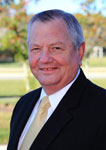Will You Be Observing the Feast or Just Attending the Feast?
by Jim Franks
 Each year, as we prepare to register for another Feast of Tabernacles, I can’t help but reflect on Feasts gone by. My family began attending the Feast of Tabernacles in the early 1960s, but we began observing the feasts sometime in the 1950s. You might wonder about my words—attending versus observing. What does it mean to observe the Feast but not attend the Feast?
Each year, as we prepare to register for another Feast of Tabernacles, I can’t help but reflect on Feasts gone by. My family began attending the Feast of Tabernacles in the early 1960s, but we began observing the feasts sometime in the 1950s. You might wonder about my words—attending versus observing. What does it mean to observe the Feast but not attend the Feast?
My story unfolded differently than most. You see, my mother became associated with the Radio Church of God about 10 years before my father. And he was unwilling to allow my mother, my sister and me to attend the Feast at that time. After all, it was 375 miles from our home in Arkansas to the nearest Festival site in East Texas.
So, for a number of years, we observed the Feast at home. We stayed home from school on the holy days, listened to the radio broadcast, studied the Scriptures and did the best we could to capture the spirit of the Feast.
It was a very different experience when we actually traveled to Big Sandy and attended our first Feast. In fact, to this day, one of my most memorable moments was walking into the metal tabernacle building in Big Sandy, Texas, on the opening night of that first year. It was electrifying! I believe we had close to 8,000 people in attendance. The building was full of people, and the sound of fellowshipping reverberated throughout. Nothing can replace the memory of that first service at our first Feast.
Notice the Scriptures about observing the Feast of Tabernacles and the Sabbath. Deuteronomy 16:13: “You shall observe the Feast of Tabernacles seven days, when you have gathered from your threshing floor and from your winepress” (emphasis added throughout). And Deuteronomy 5:12: “Observe the Sabbath day, to keep it holy, as the LORD your God commanded you.”
Wherever we are and whatever our circumstances, we are commanded to observe the Sabbath and the festivals, even if we are unable to attend a service. It isn’t ideal, but when one is unable to attend the Feast or Sabbath services during times of sickness or other hardship, one can still observe them at home.
Leviticus 23:41 admonishes us: “You shall keep it as a feast to the LORD for seven days in the year. It shall be a statute forever in your generations. You shall celebrate it in the seventh month.”
Keeping the Feast meant traveling to where God placed His name. “And you shall eat before the LORD your God, in the place where He chooses to make His name abide, the tithe of your grain and your new wine and your oil, of the firstborn of your herds and your flocks, that you may learn to fear the LORD your God always. But if the journey is too long for you, so that you are not able to carry the tithe, or if the place where the LORD your God chooses to put His name is too far from you, when the LORD your God has blessed you, then you shall exchange it for money, take the money in your hand, and go to the place which the LORD your God chooses” (Deuteronomy 14:23-25).
God intends that we experience the Feast of Tabernacles in a place that He has chosen. He expects us to attend the Feast, but it is possible to attend the Feast and not properly observe the Feast. I am afraid that at times some have treated the Feast as a vacation, simply time away from home and the normal schedule. Having observed the Feast at home, I can tell you what a difference it is to actually attend a Festival site. When you are alone with your family, you are forced to consider the spiritual meaning of the Feast in a different way. I am not advocating that you do this, but I am happy that I learned to observe the Feast before I ever attended the Feast. I believe it made a difference.
Check out the new U.S. Feast sites this year. We have a total of six that are new—Redmond, Oregon; Solvang, California; Estes Park, Colorado; New Braunfels, Texas; Hapuna Beach in Hawaii (returning—we were there in 2013); and Kalahari Resort in the Pocono Mountains of Pennsylvania. This year in the middle of the negotiations for the site in Sheboygan, new management informed us they were not interested in signing another contract. At that late date we were unable to locate another site in the Wisconsin area. Because of the distance, this will make it more difficult for some; but we hope that the number of new Festival sites will lessen the difficulty of not having one in Wisconsin this year.
I sincerely encourage you to both observe the Feast and attend the Feast. It should be the spiritual highlight of your year. Remember, it’s not a vacation, but a commanded assembly. Make your plans to register either online or in your local congregation between April 19 and May 6, 2015. This will help us greatly in our Festival planning.
Above all, I pray that this Feast will be spiritually and physically rewarding—indeed, the best ever! Don’t just attend the Feast this year, but make sure you also observe it as God commanded!
